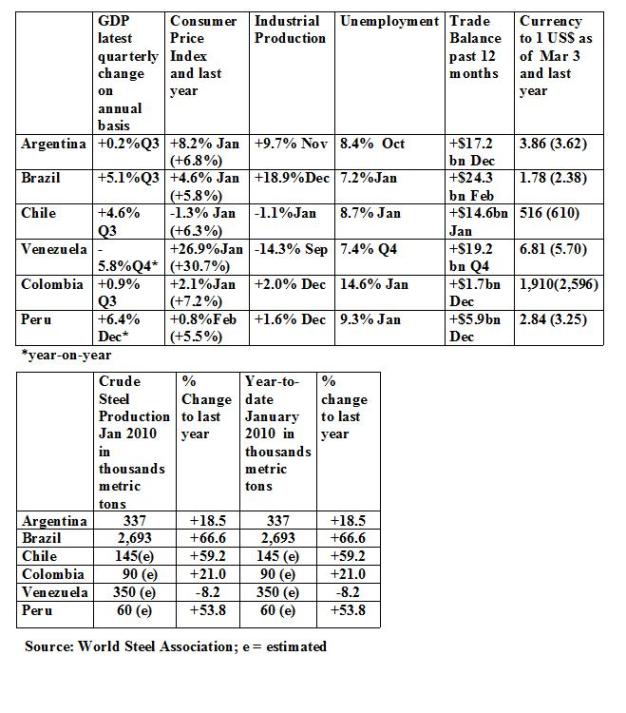Argentina: Despite never-ending economic and political dramas, the country seems to be on its way to overcome the fallout of the global financial crisis. The manufacturing sector is growing again and January saw a very robust trade surplus of $1.22 billion. Furthermore, President Cristina Fernandez de Kirchner issued two decrees that would transfer $6.6 billion from the central bank's foreign currency reserves into the government's coffers. These funds will be used to partly pay off old debts to international organizations and to cover other public debt payments. It is a highly controversial move that has been executed without Congressional approval. Great Britain's start of drilling for oil and gas just off the Falkland Islands has incurred the wrath of the Argentinean government. Argentina has always claimed the Falklands or "Malvinas" as its own. In stark contrast to the many divisive economic issues, the government can count on popular support in this cause.
Brazil: Central bank officials have conceded that the economy could be overheating. Inflation in January was a surprisingly strong 0.75 percent, pushing the index for the past twelve months to 4.6 percent. Indications are that an interest rate hike could be imminent. Bank lending is slowing down as the loan-to-GDP ratio in January fell for the second month in a row. Most incentives in the stimulus package are coming to an end such as tax rebates on new cars. There are other concerns. One is the continuing strength of the real which could restrain exports just as much as a famously creaking infrastructure. Farmers claim that they lose up to $1.0 billion a year in lost soy exports because of hopelessly congested ports in the northern state of Maranhao.
Chile: The country's steady path to economic recovery was seriously interrupted by an extremely powerful earthquake late February offshore in the southern part of the country. It is too early to assess all the damages. The human toll seems to be between 800 - 900 lives lost. Eqecat, a risk modeling company in California, estimates that the monetary damages will fall in the range of $15 - $30 billion or up to 20 percent of Chile's GDP. But the outgoing government of the popular president Michelle Bachelet has $11.0 billion saved in a sovereign fund leaving her successor, Sebastian Pinera, well equipped to finance the clean up and reconstruction.
Venezuela: The country fell into recession in Q2 of last year and will not emerge from it before Q3 of this year. This bleak forecast was disseminated by government officials. Imports in Q4 of 2009 collapsed by 40 percent and January's currency devaluation will render imports even more expensive. The manufacturing sector shrank 7 percent in Q4 2009 and water and electricity shortages continue to plague the country. Government officials have been travelling to Russia and China to encourage developing oil fields in the Orinoco belt. No need to ask French or American oil companies. Their operations were expropriated in 2008.
